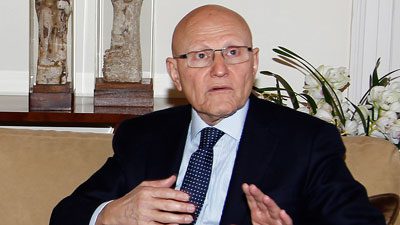
BEIRUT — In an interview with The Arab American News, Lebanese Prime Minister Tammam Salam affirmed his opposition to the policies of disabling the government, which are being employed by some components in his cabinet.
Salam was designated by the Lebanese Parliament as a consensus prime minister last year. After more than nine months of negotiations, he succeeded in forming a unity cabinet that contains Lebanon’s two main rival political blocs, the Syrian-backed 8 March Alliance and Western-backed 14 March Alliance.
After the end of President Michel Sleiman’s term on May 25, and the Parliament’s failure to elect a new head of state, Salam’s cabinet assumed the role of the presidency. Salam told The Arab American News that he will not call for a meeting for the cabinet until all the sides show a positive will for cooperation and warned of the repercussions of debilitating the government, including security threats.
The PM urged Lebanese factions to take advantage of the international community’s decision to safeguard Lebanon from the regional turmoil. He said the Lebanese should not miss out on that chance and act by electing a new president.
The Arab American News: How would you describe the state of the government in light of the feuds between its components?
Tammam Salam: I head a government of national unity, a consensus government. When it was formed, it was called a safety net for Lebanon. The government was formed with regional and international blessings. As far as I know the purpose and support of the government have not changed, so I do not know why it’s being disabled internally.
TAAN: How do you deal with the differences and contradictions in the cabinet?
TS: After the cabinet was frozen because of the feud over the mechanics of its work after the presidential vacuum, I followed a policy of consensus to manage the government and take decisions. Some people blamed me for my decision and urged me to use my full constitutional powers, but I insisted on choosing consensus in this exceptional period that Lebanon is going through. But unfortunately, consensus was used negatively, which led to less productivity.
TAAN: How will you deal with the dispute between the two blocs in the cabinet?
TS: In the last two cabinet meetings, the mutual efforts to cripple the government reached their peak. I had endured a lot and attempted to smooth down the edges, but the situation has become unbearable. This will affect important matters that relate to citizens’ issues and eventually paralyze the country. I cannot accept this. That’s why my decision was not to call for a cabinet meeting until all factions agree to get back to productivity.
TAAN: Who is responsible for disabling the government?
TS: All the political parties are partners in crippling it. Each meeting, a side takes on that mission, as if they are taking turns in disabling the government.
TAAN: Why did you decide to stop calling for meetings instead of trying to find settlements between the cabinet’s sides over the contested issues?
TS: I have no interest in entering the chaos of patronage and power struggle between the political parties… It is not my business. It is not my role. I am only concerned with my position as a prime minister. I will not pick a side over another. I will not steer the cabinet in a direction that opposes the national interests. If I do anything like that, it would go against the purpose of the cabinet as a safety net.
TAAN: What are the priorities you are focusing on at the moment and how much can you achieve in this situation?
TS: I am not an epic hero. I don’t claim that we can do miracles… What I’m trying to do is to raise the country and protect the interests of the people and the state.
TAAN: What are the dangers of the situation in the cabinet?
TS: As a prime minister, I am responsible to the people. I did not take this responsibility to cover up mistakes. I came to work. And if this policy of disabling the government, which led to the presidential vacuum and crippling the Parliament, continues, it will mean a deafening fall of the image of the state. This will turn negatively on everything, from social issues to government services to security. My fear is that those who count on weakness of the state will try to fill the vacuum with moving chaos to compromise the country’s security. Some recent phenomena are worrisome, like the man who was firing his gun from a rooftop and was not arrested or the fact that some of the prominent criminals who were kidnapping people for ransom remain free. This has sent the wrong message to some people in Tripoli, where militants were arrested. It appeared that the law is being applied selectively, which hurts the credibility of the state.
TAAN: Are you worried that Lebanon might lose the “frail stability” that it still enjoys?
TS: In the face of the earthquake of turmoil that hits the region, Lebanon has succeeded so far in limiting its losses. It is no secret that the international community has decided to safeguard Lebanon from the neighboring events. Why would we miss out on this opportunity? Is it right to let the country slip away from our hands for narrow, factional interests and feuds?
TAAN: What about the presidential election in this expanding vacuum?
TS: At the beginning of every cabinet meeting, I reaffirm the need to elect a new president as soon as possible. The continuation of the vacuum is not acceptable.
TAAN: Do you predict the cabinet will be productive again soon?
TS: What is needed of all the sides that constitute the cabinet is dialogue and understanding. As for me, I am ready to serve the Lebanon through the cabinet through securing the maximum possible productivity.






Leave a Reply